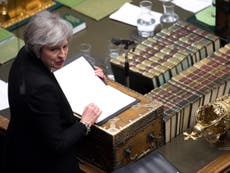Don't relax now, Theresa May – your Brexit allies are for turning
The European Research Group may have rallied around the prime minister this time, but they will yet prove themselves to be unreliable friends

At last month’s EU summit, I’m told, Theresa May pleaded with the 27 leaders to describe their withdrawal agreement as “the only deal” on offer instead of “the best deal,” as they had planned. They obliged. Now, remarkably, May has rejected a key plank of her own deal – the backstop to prevent a hard Irish border – in order to keep it on life support.
True, May won a victory of sorts in the Commons last night. Her deal would have died if MPs had rejected Sir Graham Brady’s amendment calling for “alternative arrangements” to the backstop. But she needed to pander to hardline Eurosceptics to cobble together a majority for it.
The European Research Group (ERG), chaired by Jacob Rees-Mogg, rallied behind the Brady plan. But May misrepresented their support by arguing that the vote showed there is “a route that can secure a substantial and sustainable majority” for a deal.
I suspect the ERG will prove temporary and unreliable allies. Casting doubt on May’s verdict, some Brexiteers cheerily made clear they were not committed to voting for a revised deal when it returns to the Commons next month. Boris Johnson said their backing was “on the condition that the backstop is removed”. (It won’t be.) His ally Conor Burns, who also backed the Brady plan, said: “I do not support the withdrawal agreement.” Steve Baker, the ERG’s deputy chair, said: “A vote for the Brady amendment is a vote to see if the PM can land a deal that will work. If not, then we are not committed.” If May failed to win enough changes to the backstop, he said, “we will vote it down enormously, as we did before”.
Such remarks reveal the real agenda of (at least some) Eurosceptics – giving May hope they will back her deal, so the UK moves closer to the no-deal exit that some of them would prefer.
Some senior civil servants believe that, despite triumphalist headlines about May’s victory and an outbreak of Tory unity, the prime minister has moved on to the Eurosceptics’ ground, rather than the other way round. They worry that the hardliners are spinning out the EU negotiations to run down the clock.
To get over the line last night, May also had to give a warm response to a “Plan C” drawn up by an unlikely alliance of Eurosceptic and pro-EU Tories. It would replace the backstop with an invisible border using new technology that does not yet exist. If, or more likely when, the EU does not buy that, there would be a managed no-deal exit by December 2021 on World Trade Organisation terms. Even some May allies regard the plan as unrealistic; they know it won’t fly in Brussels.
EU leaders may soon prove more flexible than their tough initial reaction to last night’s votes. They do not want a no-deal exit or to be blamed for any disruption one caused. I suspect they will continue to reject May’s demand to reopen the withdrawal agreement. As one EU source told me: “We would only do that if we were totally sure the UK parliament would buy any changes. But we cannot be sure.” More likely are additions to the agreement in a codicil spelling out the backstop’s temporary nature. But that would be viewed by Eurosceptics as having less legal force than the agreement itself.
Brussels will probably agree to extend the two-year Article 50 process to prevent a crash-out. May is spinning the plates. She knows she will need an extension to get the legislation on her deal on the statute book. But for now she wants to keep the spectre of no deal hanging over the EU and Tory and Labour MPs. That points to a short, technical extension that cannot be described as delaying Brexit.
May’s reprieve may prove short-lived. Yvette Cooper’s plan for a bill to prevent a no-deal departure was rejected last night but more MPs will back it as the clock ticks down to 29 March. May cannot ignore last night’s vote for a softer, cross-party motion saying the UK will not leave the EU without a deal. Although not legally binding, as Cooper’s move would have been, it signals trouble ahead for May: MPs, and several of her own ministers who oppose no deal, have given her only two weeks to make progress. (Her next Commons statement will be made on 13 February.)
May is claiming her cross-party talks are still alive. She will meet trade union leaders to discuss safeguarding workers’ rights, and try to grow the band of 14 pro-Brexit Labour backbenchers who defeated Cooper’s plan last night. She will need the support of more Labour MPs to have any chance of getting a tweaked deal through. Her one-to-one talks with Jeremy Corbyn are overdue but will go nowhere. These moves are a figleaf. The real negotiations are with Tory Eurosceptics and the Democratic Unionist Party. As one Tory former cabinet minister told me: “This is not a serious cross-party effort. It is just not Theresa May’s nature; she doesn’t do consensus.”
Pandering to the Europhobes never works. As BBC TV’s excellent Inside Europe:Ten Years of Turmoil series is reminds us, David Cameron pulled the Tories out of Angela Merkel’s mainstream centre-right EPP group, vetoed an EU treaty that then went ahead anyway and promised the referendum that landed us in the mess we’re in now.
The Eurosceptics are never satisfied; they won’t be this time.



Join our commenting forum
Join thought-provoking conversations, follow other Independent readers and see their replies